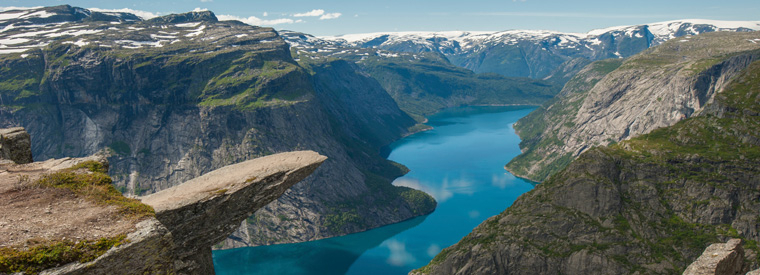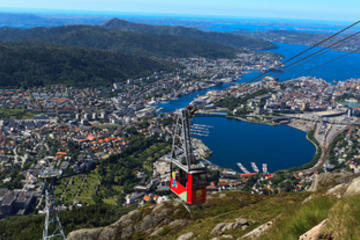« home • europe • NORWAY • Discover Norway
Discover Magical Norway

Throughout Norway, one will find stunning and dramatic scenery and landscape. The west coast of southern Norway and the coast of northern Norway present some of the most visually impressive coastal sceneries in the world. National Geographic has listed the Norwegian fjords as the world's top tourist attraction.
A | B | C | D | E | F | G | H | I | J | K | L | M | N | O | P | Q | R | S | T | U | V | W | X | Y | Z
» Akershus Castle & Fortress (Akershus Slott)
Akershus Castle, also known as Akershus Slott, is a historic Norwegian landmark that dates as far back as the medieval period when it was built in 1299 as a residence for the royal family. Since then it was updated and used for multiple purposes: in 1592 as a fortress to protect Oslo against sieges, mainly from rival Sweden at the time, in 1637 as a renaissance castle, and was even used at the first half of the 19th century as a full-fledged prison. Today it's headquarters to the Ministry of Defense …
» Bygdoy Peninsula
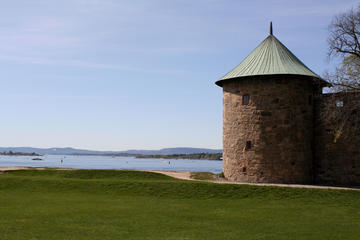
Jutting out into Oslo Fjord, the Bygdoy Peninsula is a one-stop leisure destination just west side of the city center. A clutch of Norway's most popular museums are found here along with hiking and cycling trails, beautiful - if small - beaches at Huk and Paradisbukta, plus several cafes and seafood restaurants. Come sunny days, the peninsula is full to bursting with Oslo families enjoying the peninsula's laid-back vibe and the organic farm at the Royal Manor, which is the summer residence of King Harald V …
» Holmenkollen Ski Jump
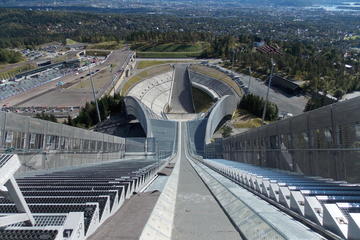
Holmenkollen is an Oslo landmark hill north-west of the city center; there has been a ski jump here since 1892 but the present-day 'S'-shaped jump at Kongeveien was constructed in 2010. The jump is 394 ft (120 m) long and it is 197 ft (60 m) high and it's one of Norway's best-loved visitor attractions. There's plenty of year-round outdoor and indoor action at Holmenkollen: climb the 250 steps to the viewing platform for vistas across the scenic Nordmarka protected wilderness …
» Kon-Tiki Museum
The Kon-Tiki Museum is home to a variety of boats and other artifacts from the famous Thor Heyerdahl's expeditions. Thor Heyerdahl is a Norwegian expeditionary and ethnographer who famously sailed by raft from South America to the Tuamotu Islands. The museum includes the very raft used during that expedition. The museum also houses permanent exhibits on Ra, Tigris, Kon-Tiki, Fatu-Hiva, and Easter Island and even has a cave tour and an underwater exhibition …
» Kvaloya
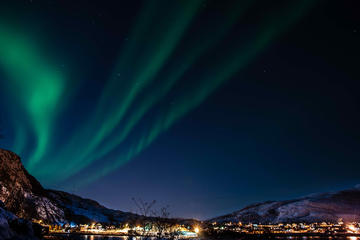
Kvaloya is Norway's fifth-largest island, covering 740 square km (285 square miles), and its name translates from Sami to "Whale Island" thanks to its cluster of central mountains. Lying west of Tromso and connected by the elegant spans of the Sandnessund Bridge, the eastern shores of Kvaloya now form a suburb of the city, known as Kvaloysletta and home to a population of about 10,000. Of its snow-capped peaks, Store Blamann is the highest at 1,044 meters …
» Lyngen Alps
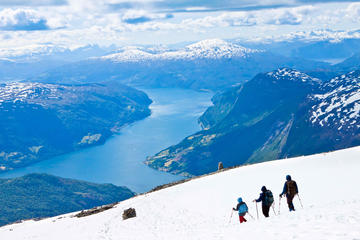
Located 300 km (186 miles) into the Arctic Circle northeast of the city of Tromso, the Lyngsalpene (Lyngen Alps) are a 90-km (56-mile) range of untamed mountains stretching from Lyngenfjord in the south and heading north to Ullsfjord almost on the border with Sweden. They form a spectacular landscape of deep gorges, gleaming icy glaciers and wild, boulder-filled rivers, with cliffs rising sharply up to 1,000 meters (3,280 feet) from the sea …
» Munch Museum (Munchmuseet)
_d902-33.jpg)
Named and built after the Norwegian symbolist painter Edvard Munch, the Munch Museum (or Munchmuseet) first opened its doors in 1963 to commemorate what would have been the painters 100th birthday. It contains 1,200 paintings, 4,500 drawings, 18,000 prints, and 6 sculptures, watercolors, and graphic art, all bequeathed to the city of Oslo upon Munch's death. The museum also contains less conventional pieces of Munch's artwork, including lithographic stones, etchings, and woodcut plates …
» Oslo Cathedral (Oslo domkirke)
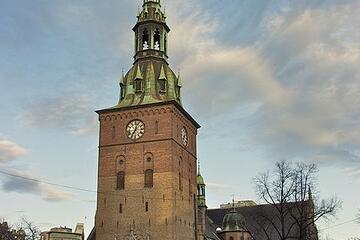
With the church originally established in Norway during the 11th century, the Oslo Cathedral is a Dutch baroque cruciform church that was consecrated in 1697. Its historical significance as Norway's first church - home to Oslo's diocese - is unprecedented, hosting a range of national, royal and parliamentary events. Visitors to the cathedral can see elements of its transformation undergone through various reconstruction efforts over the last 400 years, from gothic to baroque eras …
» Oslo City Hall (Radhus)
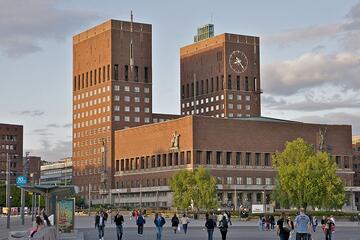
Home to the Oslo City Council and numerous galleries and studios, the Oslo City Hall (or Radhus) showcases the city's political and cultural sides. It is widely considered one of Oslo's architectural gems, winning the 2005 vote for Oslo's "Structure of the Century." Planning for City Hall began in 1915 and served a dual purpose: not only establishing an Oslo City Hall, but also replacing the old Oslo harbor slums. The building exemplifies a changing mentality in Norwegian architecture …
» Oslo Cruise Port
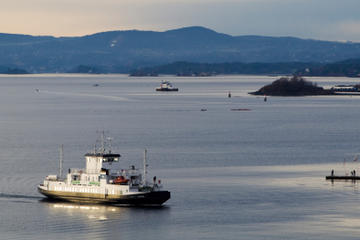
The capital of Norway, Oslo is the second busiest port in the country, ranking behind only Bergen. It is one of the world's largest capital cities, but also one of the least densely populated. Your cruise ship will dock in Oslo within easy walking distance of many major sights. Trams and water taxis are available to take you to further into the city or to the several museums located across the harbor on Bygdoy Peninsula …
» Oslo Fjord
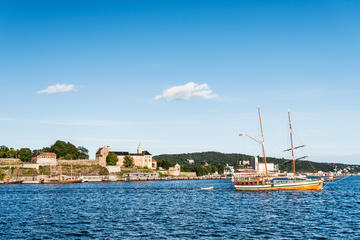
The cool, contemporary city of Oslo lies at the head of its fjord, a calm, clear body of water some 68 miles (107 km) in length that leads out to the Strait of Skagerrak and in turn to the Baltic and North seas. It is a summertime paradise for the lucky inhabitants of Oslo, scattered liberally with islets, isolated coves, and little pockets of beach. Oslo Fjord is best discovered by boat, and there are many options for day trips from many-sailed clippers to island-hopping ferries …
» Oslo National Gallery
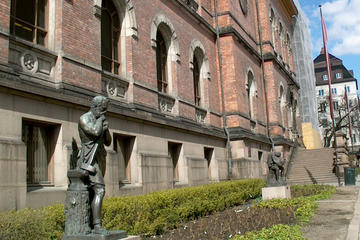
The Oslo National Gallery houses a proud collection of works comprised mainly by works of Norwegian painters from the 19th century until about 1945. These are including but not limited to famous landscape painter J. C. Dahl, T. Fearnley, H. F. Gude, naturalist painter and illustrator C. Krohg, and G. P. Munthe. There is also a special separate exhibit devoted to the much beloved Edvard Munch and his world renowned painting 'The Scream,' back in action after its theft in 2006 …
» Oslo Opera House
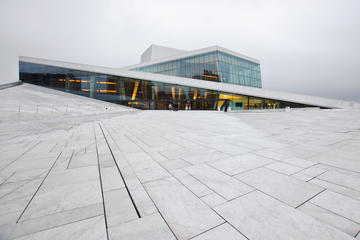
Norway's stylish, innovative new arts center opened in 2008 at Bjorvika, with views stretching out over Oslo Fjord. It is home to the national ballet, opera and orchestral companies but audiences probably come as much for the sublime waterside setting of this gleaming white auditorium as they do for the performances. Designed by Norwegian architect Tarald Lundevall, who also built the National September 11 Memorial Museum & Pavilion in New York …
» Polar Ship Fram Museum
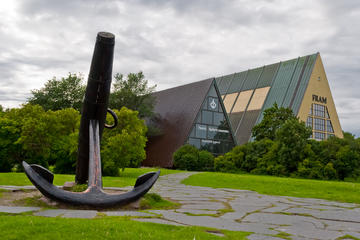
Along with the Kon-Tiki and Norwegian Folk museums, the Fram is another of the crowd-pullers on the Bygdoy peninsula. It's found in a new and extraordinary pyramidal structure with a vast portrait of Roald Amundsen projected on to the facade, which houses the most famous Norwegian polar-exploration boat of all time, the icebreaker Fram. Fram was veteran of many Arctic voyages when Norwegian explorer Roald Amundsen - the first man to reach both North and South Poles …
» Slottsparken (The Royal Palace Park)
Located in central Oslo, Slottsparken (or the Royal Palace Park) is the city central park that surrounds the Royal Palace. Construction began in the 1820s by Hans Linstow, the same architect who built the palace, although because of financial restrictions it took more than 30 years to put together. Altogether more than 2,000 trees were planted, most of which are still standing. The main feature of the park is The Royal Palace, which is the main residence of Norwegian royalty …
» Tromso Fjords
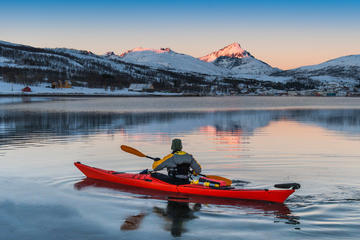
Thanks to its spectacular location among a series of islands and skerries laced with waterways and scalloped inlets, and to its backdrop of snow-clad peaks, Tromso is the epicenter of day trips out into fjords bordering the Norwegian Sea. These long, narrow sea inlets are characterized by steep, mountainous slopes carved out by glaciation during the last Ice Age. Within easy reach of Grotfjord, Erdsfjord, Balsfjord, Lyngsfjord and Kattfjord on the neighboring island of Kvaloya, the city is connected to this spectacular seascape …
» Vigeland Sculpture Park
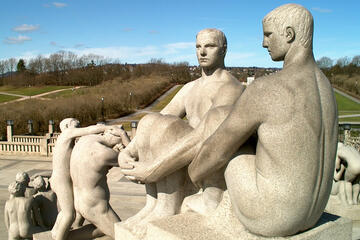
Comprised of 212 granite and bronze sculptures of Norwegian native sculptor Gustav Vigeland, Vigeland Sculpture Park is the largest sculpture park exclusively showcasing the work of a single sculptor. Divided into 6 divine sections including The Main Gate, The Bridge, The Children's Playground, The Fountain, The Monolith Plateau and the Wheel Life, the park is a must for Oslo goers. With each section a virtual exhibit, upon entrance through The Main Gate, strollers will see 7 gates with 2 copper-roofed gate houses …
» Viking Ship Museum
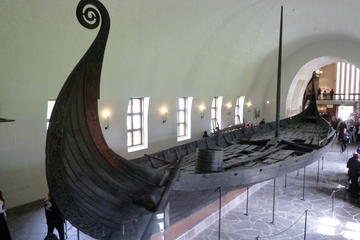
Another of the museums on Bygdoy Peninsula, the Viking Ship Museum displays a surprisingly decorative collection of Viking grave goods discovered around Oslo Fjord but is best known for the Viking ships that are elegantly displayed in pristine white galleries. Three ninth-century longboats were excavated in southern Norway after centuries of being buried in peat. The wooden ships have been painstakingly reconstructed and - despite their lengthy incarceration - are virtually complete …


